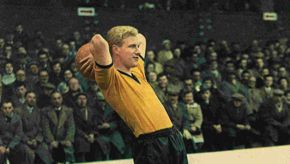Peter Broadbent was a football genius, probably the most naturally gifted player ever to don the famous gold and black of Wolves.
The midfield maestro, who has died aged 80, was a star performer in the 1950s, the greatest era in the club’s history, when Wolves were three times champions of England.
George Best became an admirer through watching television highlights of Wolves games on TV as youngster, while many years later Peter Knowles confessed he tried to model his style of play on that of Broadbent.
Knowles once said of him that he was “like a ballet dancer on grass” such were the silky skills of the man whose football career began with Dover Town in the Kent League.
Broadbent, from the Kent mining village of Elvington, was signed from Dover by Brentford but he did not stay long at Griffin Park. His mentor at Dover had been George Poyser who then moved to Molineux as a coach and alerted Wolves to the talented 17-year-old. They snapped him up in February, 1951, for £10,000, which was then a record fee for a teenager. He had played just 16 games for Brentford in a team who included Jimmy Hill.
His Wolves debut was in March, 1951, against Portsmouth at Molineux and he scored his first goal for the club against Albion at the Hawthorns the following month. While he had an extended run in the Wolves side in 1952–3 it was the following season that saw Broadbent really establish himself as he helped Wolves bring the championship title to Molineux for the first time in the club’s history.
It was also in 1953–4 that Broadbent played in England’s first ever under-23 international, alongside Manchester United legend Duncan Edwards, against Italy in Bologna. In view of his subsequent displays for Wolves, it baffled many that he was not given his chance in the full England team until four years later.
Broadbent’s international debut could hardly have been tougher – he gained preference over Albion’s Bobby Robson for the vital group 4 play-off with the USSR in the 1958 World Cup finals in Sweden. Although England lost 1–0, Broadbent impressed and all reports made him England’s star player.
He would add only six more caps, however. Yet after Broadbent scored England’s goals in a 2–2 draw with Wales at Villa Park, no less a figure than Stanley Matthews asserted in his newspaper column that England ought to build their side around Broadbent.
With a wicked body swerve and immaculate ball control, Broadbent was at his peak during the greatest three seasons in Wolves’ history. In 1957–8 and 1958–9 they were champions of England once more and though 1959–60 saw them just miss out on a title hat-trick by a point, they had the glorious consolation of winning the FA Cup, beating Blackburn 3–0 in the final at Wembley.
Broadbent was the only Wolves man who played in three title-winning sides, an FA Cup winning side and in the famous four friendly victories under the Molineux floodlights – against Honved of Hungary, Soviet giants Spartak and Dynamo and European champions Real Madrid.
Although he was regarded as maker of goals for others, Broadbent scored a remarkable number himself. Starting in 1955–6, he reached double figures in six successive seasons and eventually totalled 145 goals in 497 appearances. He stands seventh in the list of all-time appearances for Wolves and is sixth highest goalscorer in the club’s history. Only Steve Bull, John Richards, Billy Hartill, Johnny Hancocks and Jimmy Murray scored more times for Wolves.
Broadbent showed his versatility when he was once chosen by manager Stan Cullis to play centre-forward and notched a hat-trick in a 5–3 win at Portsmouth in 1958 but it is for his contribution to the Wolves midfield that he will be best remembered. While half-backs like Clamp, Wright, Flowers and Slater were vital to Wolves’ success, it was Broadbent who brought improvisation to the team and sometimes a touch of arrogance.
On song, Broadbent was virtually unstoppable, an entertainer with a special place in the fans’ affections. He seemed able to beat an opponent with just a shrug of his shoulders or swivel of his hips.
His final game for Wolves was on Boxing Day, 1964, by coincidence the debut of another Wolves legend, Dave Wagstaffe. Many thought Broadbent was moved on to Third Division Shrewsbury far too soon and could still have served the club well.
Making 84 appearances and scoring 11 goals, Broadbent became a favourite of the fans at Gay Meadow. He figured in a fine FA cup run in 1966 when Town reached the fifth round, only to lose 3–2 to Chelsea at Stamford Bridge. Broadbent scored one of the goals in a match still fondly recalled by Salop’s older supporters. Amazingly, 15,000 Town fans were there to see it.
It was no surprise when Villa eventually brought Broadbent back to the top flight in October, 1966, although he could not help them avoid relegation. He stayed with Villa for a three seasons, making 65 appearances and scoring four goals before he ended his Football League career with a season at Stockport County – 1969–70. There he played 35 League and Cup games, scoring his final League goal at Mansfield on March 23, 1970 in a 4–1 defeat. His first League goal had come nearly 20 years earlier, for Brentford in a 7–2 defeat at Grimsby on November 11, 1950.
Between that first goal and the last came many moments of magic and those of us who saw Broadbent in his prime will cherish the memory of a very special footballer.
*Peter Broadbent passed away this morning at the age of 80, after a long term battle with Alzheimer's Disease.












